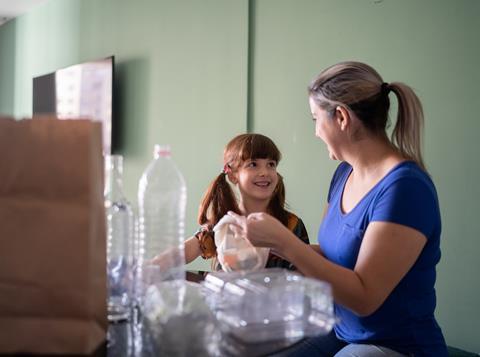Joshua Young, Circular Economy Lead at PragmatIC Semiconductor, gives his insight into the role smart reusable packaging can play in reducing waste and the impact to our environment, by extending the life and use of plastic packaging that is still fit for purpose.

Today the waste hierarchy of Remove, Reduce, Reuse and Recycle is widely understood. In fact, this is the main pillar of the strategy that many brands and retailers now follow to help prioritise efforts to minimize consumption and maximize the use of packaging materials. While brands and retailers can influence their packaging, they rely heavily on the waste management systems in place to effectively collect and recycle their packaging. It is becoming clear that real progress can only be achieved if there is widespread adoption of novel circular processes and systems. Yet, recycling on its own is not the only answer, and reuse is being considered as a more effective solution.
What’s needed is something far beyond the old traditional ideas of reuse – like returning milk bottles to be washed and reused. The future is smart reusable packaging at scale. Leveraging novel digital technologies to enable consumer packaging to be effectively identified, sorted, washed, and returned for reuse. This needs to go much further than reuse programmes such as the Loop trials.
So, what are the obstacles to reaching reuse at scale and how can these be overcome?
Convincing consumers
Consumers are critical as they are central to the success of any circular system. Many consumers are used to a disposable lifestyle, so any new system that requires a change of behaviour must be accessible and convenient. For reusable packaging systems to be successful, consumers need to see packaging as a valuable asset rather than waste and should have confidence that it is safe to use. Without the buy-in from consumers, return rates won’t make the economics or environmental benefits of reuse feasible.
Convincing organizations
In recent years brand owners and retailers have encountered many different challenges, and so convincing them to test new reuse solutions is not easy. Although the potential benefits of reuse are compelling in theory, in practice the business case has yet to be fully proven. Implementing reuse systems is complex as it requires cross collaboration to create new business models both internally and externally. In particular, the network of reverse logistics and washing services required for reusable packaging, although growing, isn’t readily accessible. Further collaboration between organizations is needed to help scale operations.
Investigation into the development of reusable packaging will also be crucial, to find the balance of durability through multiple use and washing cycles, optimized for a reuse closed loop system. It’s good news that packaging companies are getting on-board with this and see the opportunities for making reusable packaging smart and connected.
Leveraging data
Reuse requires the implementation of circular systems that previously haven’t been deployed. Operational data generated from across the system can be transformed into valuable insights, to understand material flows, patterns, bottlenecks etc, and then this information will be used to optimize implementation. Smart reusable packaging allows each item to be uniquely identified and tracked throughout the system through each use. This level of data is needed to help service providers to decide how to produce, move, and process materials in a more economical and environmentally friendly manner.
TRACE project - transforming the prospects of reuse
A new technology project is in progress that will help demonstrate how smart reusable packaging at scale can become a reality. PragmatIC Semiconductor is working with academic institutions, industry partners and major retailers to use its novel flexible electronics and RFID/NFC technology to enable item-level digital traceability within the food and drink supply chains. The project, known as TRACE (Technology-enabled Reusable Assets for a Circular Economy), is aimed at the development of new digital innovations that will ensure the efficient recapture, sorting, cleaning, and return for reuse, to determine the financial viability and operational effectiveness of reuse at scale. This is part of a £1.3 million Innovate-UK grant awarded under the Smart Sustainable Plastic Packaging (SSPP) Business Challenge.
Together, all the partners involved will conduct research and testing in order to establish workable models for procedures and technological advancements that can accelerate the use of reusable packaging systems more broadly. This will make it possible for supermarkets and large FMCG companies to undertake reuse programmes on a never-before-seen scale, marking a significant advancement for the retail sector in the direction of genuine circularity.














No comments yet